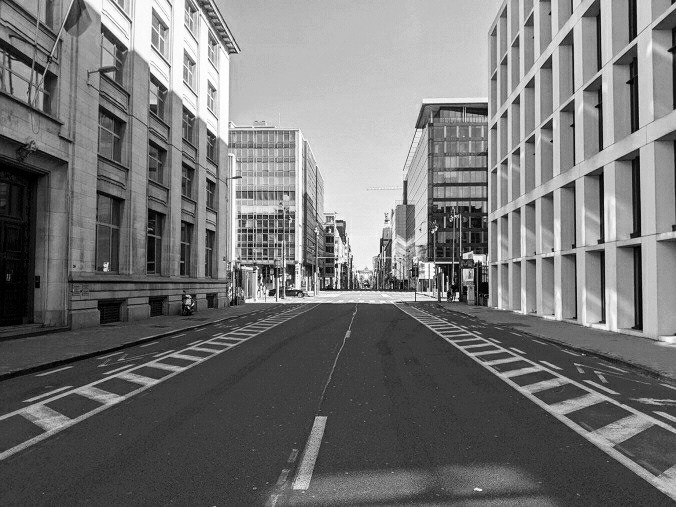BRUSSELS BEHIND THE SCENES
Weekly analysis and untold stories
This week with ALEXANDER FANTA
Other Brussels behind the scenes stories:
The Privilege of the Vaccinated
Reporting on Brussels away from Brussels
For the past six months, I have been a Brussels correspondent who doesn’t live in Brussels. As the cordon sanitaire of restrictions closed in on Europe in the fall, I decamped to my other place of residence, Vienna.
Setting up my office in a spare bedroom there, I have kept following the steady drumbeat of the EU’s calendar. Midday briefing. Council meetings. Parliament speeches. As virtual EU correspondent, I have attended more events than I would ever have done in person in Brussels. I even got mocked by Commissioner Margrethe Vestager for the dearth of books in the shelf behind me.
BRUSSELS BEHIND THE SCENES is a weekly newsletter which brings the untold stories about the characters driving the policies affecting our lives. Analysis not found anywhere else, The Brussels Times' Samuel Stolton helps you make sense of what is happening in Brussels. If you want to receive Brussels behind the scenes straight to your inbox every week, subscribe to the newsletter here.
I am not the only one who has left. Members of the Brussels bubble have spread out all over Europe during the pandemic. Anecdotes I have gathered from tweets, group messages and e-mails reveal that quite a few journalists work from family homes in Cyprus, do video calls from holiday houses in Brittany or have returned, like the heroine of the Pedro Almodovar film Volver, to small villages in Spain.
Granted, this level of flexibility works mostly for journalists and other hangers-on to the Brussels bubble. Officials shall reside in their place of employment or "at no greater distance than compatible with the proper performance of their duties", Commissioner Johannes Hahn says. Even though most staff work remotely, they must be able to come back to the office within a couple of hours, he told the European Parliament.
Friends back in Ixelles tell me that social life, once so vital to fun and policy-making in Brussels, has slowed to a glacial pace. The occasional run-in in bois de la Cambre excluded, its very hard to do what until February last year was the life-blood of this town: chatting somebody up casually, getting to know people at events, making fast friends at Kitty O’Shea’s after a European Council all-nighter. Calls and virtual events can make up for that a little, but they are no real substitute.
I do not dare to guess when I will next follow the Midday briefing from the comfy chairs of the Commission press room, or go to the Berlaymont cafeteria after for spaghetti bolo. The EU institutions have said they will start vaccinating staff and MEPs from March 22, but it remains unclear when the bulk of personnel will follow. Many journalists will probably have to wait for a while longer according to national vaccinations plans. Most of us should not expect to get the much-wanted jab before well into the summer. Until then, EU correspondents will remain mostly Zoom-powered and working from home, wherever that happens to be at the moment.
What the virtualisation of Brussels reporting means for our journalism is hard to tell just yet. Even those still in town find it harder to meet sources, harder to overhear interesting titbits or to follow which MEP is hobnobbing with lobbyists at an industry event. It has also become easier for Commissioners and top officials to dodge questions without face-to-face encounters with the press pack. But much of what happened before simply happens online. Briefings are given, proposals are studied, documents leaked.
Meanwhile, the crisis in journalism’s business model continues. The pandemic has caused publishers across Europe to lose advertising revenue, while some reporters in Brussels had to face job cuts or reduced hours. With most events moving online, the pandemic could provide cover for media outlets to cut EU coverage further. Do we really need a Brussels office when everything is streamed anyway?, some editors will ask.
I believe real-life, in-person reporting will remain essential for European Union coverage, even if not much of it happened over the past year. Journalism relies on informal conversations with sources, on incidental discoveries and on contextual knowledge of an institution a lot more than most non-journalists think. Vivid quotes are best collected not in video calls, but in noisy bars at the end of the night. The return of journalists to the press room will bring not just a reprieve from the boredom of working at home, but will help to breathe fresh information into EU coverage.
BRUSSELS BEHIND THE SCENES is a weekly newsletter which brings the untold stories about the characters driving the policies affecting our lives. Analysis not found anywhere else, The Brussels Times' Samuel Stolton helps you make sense of what is happening in Brussels. If you want to receive Brussels behind the scenes straight to your inbox every week, subscribe to the newsletter here.

